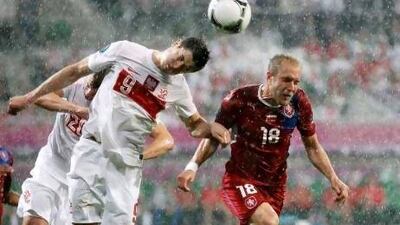There are strong Polish curses, a chorus of groans around Gniewino-Pub. Honorata, the attentive barmaid dressed head-to-toe in red almost knocks the dual Polish flags off her headband.
Her team, completely dominant for the first half-hour of what their coach had called "the most important match of their lives", have just lost the goal that will send them out of the Euros.
"Poland is not yet lost," runs the first line of a national anthem observed in upright unison by this village pub. When Rafal Murawski charges into trouble deep in the Czech Republic half and their opponents break away for the persistently threatening Petr Jiracek to convert, they have.
Poland merited better. They had thrown heart, soul and no small measure of technique into the rain and lightning of Municipal Stadium in Wroclaw. But they were gone.
In its trails for Poland's final group game, state broadcaster and Euros rights holder TVP hung a Polska scarf around the shoulders of a smartly suited male presenter. The incongruity was justified: as this tournament has progressed the nation has turned increasingly red and white.
Technically illegal for ordinary civilians to display, a flag embellished with Poland's white eagle coat of arms flies from more and more cars. Young female supporters, part of a generation in which many had lost interest in their national team, dress in eye-catching red-and-white outfits then head for the local fan park to demonstrate their support.
Match days have Poland shirts - one broad red horizontal stripe on a white background, white eagle crest centred above it – proliferating through villages, towns and cities. A red-and-white lipstick pen is a popular purchase, employed to daub the cheeks of Polish nationals and football following visitors alike.
Polska scarves are everywhere, added to the daily dress of foreign fans in the four Euros stadiums or partying in the bars and streets of host cities. The chant of "Polska, Bialo-Czerwoni" now belongs to supporters of almost every nation, singing it to smiling applause at their own team's games as soon as they've come to terms with the pronunciation. "Poland, red and white" indeed.
How much all of this aided Poland's players is a point of debate. National Stadium on the tournament's opening night was raucous to behold; yet the home team seemed to spend itself in a recklessly intense 45 minutes of aggression. Poland's coach, Franciszek Smuda, talked of his men being "paralysed by pressure" in a second half where they lost a lead, and almost the game, to 10-man Greece. In truth, they looked exhausted.
A goal down to Russia in the second Group A fixture, passion transmitted itself into the boot of Jakub Blaszczykowski for a spectacular, and critical, equaliser. Finding any kind of balance to their play was a constant struggle. "Polish fans want their players to attack," says Pawel Protasiewicz a local fan. "It's hard for the team to do anything else."
Though that team is gone from the competition, Poland remains on course to end it a winner. Their Euros have shown this hospitable, generous, humble nation to the world. Their new guests will be back for more.
Follow us

